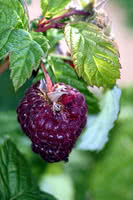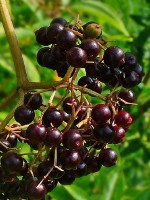Mon-Fri 9am - 5pm Mountain time
Royalty Raspberry vs Ranch Elderberry
Rubus x Royalty
Sambucus canadensis Ranch
NOT AVAILABLE THIS SEASON - MIGHT RETURN
Royalty Raspberry is a productive and delicious red-purple raspberry. It is a cross between a red raspberry and a black raspberry. Ripening in late August, the berries are ideal for homemade jams, preserves, and fresh eating.
If you are going for more of a classic red raspberry taste, pick the berries early. But if they are left on the cane until they are purple the taste will be sweeter.
Royalty Raspberry is a floricane-fruiting variety, meaning it primarily produces fruit on second-year canes (previous season’s new growth). They are also referred to as summer-bearing. In late winter or early spring, cut back all spent floricanes, leaving only last season's canes.
Raspberries are self-fertile, meaning they do not require cross-pollination from another variety to produce fruit.
This very popular extra large berried variety was developed at Cornell University.
Ranch Elderberry is a vigorous and high-yielding Black Elderberry cultivar. It ripens earlier than other varieties and is smaller and more compact making berry harvest easier. The berries are well-suited for baked goods, jams, jellies, and syrups. They are high in vitamin C and reported to be beneficial for the immune system.
Black Elderberries are considered to be partially self-pollinating. So while they will still produce some berries without cross-pollination, planting with another variety will increase yields. Consider planting with Black Elderberry or Bob Gordon Elderberry.
Warning: the seeds, stems, leaves, roots, and uncooked berries are toxic to humans when eaten in quantity. Berries should be cooked to make them safe for human consumption.
Royalty Raspberry Quick Facts
Ranch Elderberry Quick Facts
Toxicity: leaves, stems, and uncooked berries are poisonous to humans

